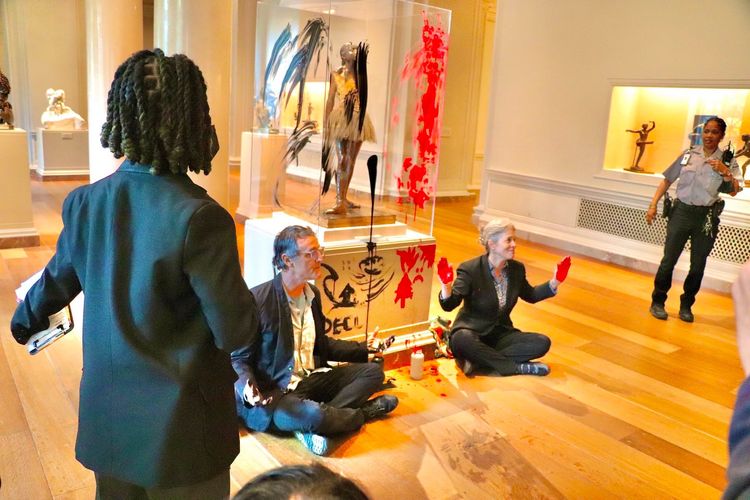The Great, Big Enormous Lie
The Great, Big Enormous Lie
By Mary Annaïse Heglar
If there’s two things the fossil fuel industry knows how to do, it’s exploit a crisis and control the narrative. (They’re actually not that good at drilling oil, lol.) Right around the time news of the war in Ukraine made it to this side of the globe, the American Petroleum Institute had its greasy hands out demanding that the Biden administration loosen the restrictions on oil and gas drilling so they can drill up more oil.
The Biden administration responded, probably a few times. But the one I want to talk about is this gem from Press Secretary Jen Psaki:
2. U.S. production of natural gas and oil is rising and approaching record levels: More natural gas than ever this year, more oil than ever next year, and, even with a global pandemic, more oil production this past year than during the previous administration’s first year.
— Jen Psaki (@PressSec) March 6, 2022
Girl, you’ve lost the plot and the narrative.
Look, I get it, there’s a lot of lies packed into API’s bullshit. The restrictions they speak of are nonexistent. The United States is a bigger oil exporter than Russia. In fact, we’re—gulp—number 1. Then there’s the fact that if you open a new oil rig today, you won’t get that oil for several months. It ain’t exactly efficient. And, for all its talk about the dangers of “foreign oil,” they have no problem registering their U.S.-based vessels in foreign countries so they don’t have to take care of their workers.
But all of those little lies pale in comparison to the Great Big Enormous Lie: that fossil fuels make us safer. They absolutely do not. Not yesterday, not today, and definitely not tomorrow. Doesn’t matter if it’s foreign or domestic, there’s no such thing as a safe fossil fuel. Keep in mind Big Oil was behind the Iraq War because they wanted their oil, all the while claiming that we needed to dig up even more oil here in the U.S. The fossil fuel industry has never seen a fire they don’t want to pour gasoline on.
The fact that our global economy and energy system is built on something so finite, so volatile, and so deadly is a problem, to put it as mildly as possible. It is a crime against humanity. If you’re going to get in a back and forth with the fossil fuel industry (which I recommend), that is where you need to start.
I get that the Biden administration wants to make it clear that these high gas prices are not their fault, but taking the fossil fuel industry’s framing is just plain stupid. For one, it shits on climate voters, which is actually a shit ton of people! Two, the fossil fuel industry wants to keep you swatting at the details and missing the point. It’s classic rope-a-dope.
Lastly, if you don’t want people to blame you for these gas prices? HELP THEM! Now would be a great time to cancel student loan debt. All of it, not just some. Or what happened to those stimulus payments we were supposed to get to help us cope with the pandemic? Bring that back. Declare a climate emergency and release those sweet, sweet funds that come with it. There are concrete things that the Biden administration can do here, but I am BEGGING them: stop taking the bait!
P.S. I don’t care that Psaki gets to clean energy at the end of her thread. She did a shit ton of damage on the way there. We all know how Twitter works. People don’t read all the way through, which is why you get to the point with the quickness.
The Great Influencer Grift
By Amy Westervelt
If you’re not a navel-gazing media person, you probably missed this week’s media Twitter debate about journalists as brands. It started when Taylor Lorenz, a well-known tech & Internet culture journalist who recently went from The New York Times to The Washington Post, was quoted in a piece in Insider about a flood of people leaving the Times over the various restrictions it places on journalists (from social media to outside projects).
Lorenz said: “Younger people recognize the power of having their own brand and audience, and the longer you stay at a job that restricts you from outside opportunities, the less relevant your brand becomes.”
A lot of her former and future colleagues were annoyed by this, the most vocal of whom was political reporter Maggie Haberman. A whole long Twitter spat ensued, in which Haberman accused Lorenz of attention-seeking (interesting for the woman who saved all her best Trump scoops for a book published after the fact, rather than informing the public). Lorenz, for her part, made a pretty valid labor rights point about individual journalists needing to look out for themselves because large media outlets certainly aren’t going to.
ANYway, missing from this entire discussion is the net negative effect the whole “brand” thing has had on journalism in general. It’s two-fold: journalists now feel pressure to engage in “brand-building” to get jobs and opportunities, leaving less time for research and reporting; and outlets weighing the benefits of attention over substance are investing far more in personal essays and opinion pieces than reporting. (Not to mention the emergence of an entirely new channel—newsletters—devoted almost exclusively to essays and opinion… yes I see the irony here!) This has unlocked a whole new opportunity to become an influencer by penning op-eds, which in some ways has had a democratizing effect on media. The fact that one good tweet can get you access to editors that previously only hired their friends has opened doors, particularly for women of color whose voices were sorely lacking in mainstream media for decades. That is a decidedly good thing. Unfortunately it has also attracted a bunch of folks who are willing to write for free, or really for clout, further eroding pay for working journalists.
This Isn’t a Game
By Mary Annaïse Heglar
Over the course of my nearly four decades on this planet (holy fuck), the Republican Party has managed to get steadily more and more extreme and dangerous. In the past couple of years, they’ve really gone ham. At the same time, the Democrats keep underestimating them. You would think with the stolen election in 2000, they’d have woken up. Or with the rise of the Tea Party in 2009, or Birtherism shortly after that. Or Trump’s first rally or Russian disinformation and interference in the 2016 election or Charlottesville or the January 6th insurrection. Or…do I need to go on?
Yet, here we are smack-dab in 2022 and Very Serious People are still making the argument that Republicans are targeting trans kids in Texas to score political points or that Putin is attacking Ukraine because he’s gone stir crazy in the pandemic. With straight faces.
Justice Is a Motivator, Not a Distraction
By Amy Westervelt
In a peer-reviewed study published last month, researchers Dana Fisher and Lorien Jasny analyzed surveys of hundreds of protestors at three climate-related events in the U.S.: the 2017 People’s Climate March, the 2019 September Climate Strike, and the 2020 Earth Day Live. They wanted to see what other issues these folks were interested in, and whether there was any consistency in the issues motivating them to get out and protest. What they found was major validation of the idea that the climate movement is a justice movement. I caught up with Dana Fisher last week to find out more.
Digest
Your weekly roundup of climate coverage.
Rising Temperatures, Rising Tides
How Climate Change Inflicts a Toll on Mental Health - The New York Times, by Sarah Kerr, Noah Throop, Jack Healy, Aidan Gardiner and Rebecca Lieberman
Lake Powell Is in Big Trouble, by Molly Taft for Earther
Rumors of this coral's survival were greatly exaggerated | Grist, by Cassie Freund for Grist
Climate crisis: Amazon rainforest tipping point is looming, data shows, by Damian Carrington for The Guardian
As War Rages, a Struggle to Balance Energy Crunch and Climate Crisis - The New York Times, by Brad Plumer, Lisa Friedman, and David Gelles
Australia Is Experiencing Some of the Worst Flooding in Its History, by Gavin Butler for Vice
Millions suffering in deadly pollution 'sacrifice zones', warns UN expert, by Damien Gayle for The Guardian
Australia Declares National Emergency Amid Severe Flooding - The New York Times, by Chevaz Clarke-Williams and Rex Sakamoto
Unesco to visit Great Barrier Reef as coral bleaching risk rises, by Graham Readfearn for The Guardian
What a Power Cutoff Could Mean for Chernobyl's Nuclear Waste - The New York Times, by Henry Fountain
'This is a fossil fuel war': Ukraine's top climate scientist speaks out, by Oliver Milman for The Guardian
The science behind Australia's east coast floods | Australia news | The Guardian
Carbon dioxide will have to be removed from air to achieve 1.5C, says report, by Fiona Harvey for The Guardian
Climate change fundamentally affecting European birds, study shows, by Sofia Quaglia for The Guardian
The Climate Presidency
Biden just banned Russian oil. Now what? | Grist, by Kate Yoder
What a Russian Oil Ban Means for US Gas Prices, by Molly Taft for Earther
Climate Hawks Join the Debate on Ukraine, by Blake Hounshell and Leah Askarinam for The New York Times
Biden Restores California's Power to Set Stringent Tailpipe Rules - The New York Times, by Coral Davenport
Republicans Wrongly Blame Biden for Rising Gas Prices - The New York Times, by Linda Qiu
Congressional Democrats Propose a Windfall Tax on Oil Profits | The New Republic, by Kate Aronoff
Climate Accountability
Our climate solutions are failing - and Big Oil's fingerprints are all over them, by Amy Westervelt for The Guardian
The Curse of Uranium – Part 1 | Health | Al Jazeera
Shell Grabs Discount for Russian Oil, Says It's Donating Profits to Ukraine, by Molly Taft for Earther
Canada's 'petro-provinces' see opportunity in Russia-Ukraine war, by Jillian Kestler D’Amours for Al Jazeera
BlackRock Doesn't Believe Oil Is Bad, Wayne Christian Says, by Molly Taft for Earther
Greenwashing for Big Oil? There's an award for that. | Grist, by Kate Yoder
Microsoft's Pursuit of Climate Goals Runs Into Headwinds - The New York Times, by Peter Eavis
Cutting truck emissions is focus of new Biden administration rule | Grist, by Julia Kane for Grist
How oil companies rebranded deceptive climate ads as 'free speech', by Amy Westervelt for The Guardian
Suddenly, oil companies are upbeat again - The New York Times, by Somini Sengupta
US beef industry emerges from Biden's climate pledges 'relatively unscathed', by Matt Krupnick for The Guardian
BlackRock, Vanguard, and UBS Are Blocking Climate Progress | The New Republic, by Olúfẹ́mi O. Táíwò
The U.S. Bans Russian Oil. Big Energy Shrugs, by Kate Aronoff for The New Republic
Can turning down our radiators turn up the heat on Vladimir Putin?, by Fiona Harvey for The Guardian
Justice Is Justice Is Justice
How Redlining Contributed to Air Pollution Across America - The New York Times, by Raymond Zhong and Nadja Popovich
Climate change will fuel greater displacement, by Alexandra Bilak for Al Jazeera
Air Force wants to blow up toxic waste on a beach in Guam | Grist, by Julia Kane
'Respect Science': Mona Hanna-Attisha Shares Climate Lessons From Flint | Atmos, by Yessenia Funes
After the floods, Mullumbimby is a disaster zone. But the community pulls together like no other, by Fleur Brown for The Guardian
Glimmers of Hope
E.P.A. to Tighten Tailpipe Rules for the Biggest Polluters on the Road, by Coral Davenport for The New York Times
Sparking Joy Through Climate Action, by Daphne Chouliaraki Milner for Atmos
Your Induction Stove Is the First Step Toward Plugging In the Whole House, by Ronda Kaysen for The New York Times
Climate in Culture
How high can gas prices go? by Rebecca Leber for Vox
How clothing forms the fabric of society, both past and future | Grist, by Eve Andrews
The Tiger Widows of India Conserving the Mangrove Forest Where Their Husbands Died | Atmos, by Agnee Ghosh
Is This Finally the Year of the Electric Car? By Ginia Bellafante for The New York Times
Six key lifestyle changes can help avert the climate crisis, study finds, by Matthew Taylor for The Guardian
Carmakers Race to Control Next-Generation Battery Technology, by Jack Ewing and Eric Lipton for The New York Times
An Architect Who Mixes Water and Nature to Build Resilience, by Sam Lubell for The New York Times
Plus More
Stranding of three whales in Corfu raises alarm over seismic testing for fossil fuels, by Alex Sakalis for The Guardian
Insane Footage of Flash Floods As Sydney Cops Torrential Rain, by Arielle Richards for Vice
Chernobyl Is Cut Off From Power, but Experts Downplay Radiation Risks, by George Dvorsky for Earther





Only paid subscribers can comment.
Please subscribe or sign in to join the conversation.